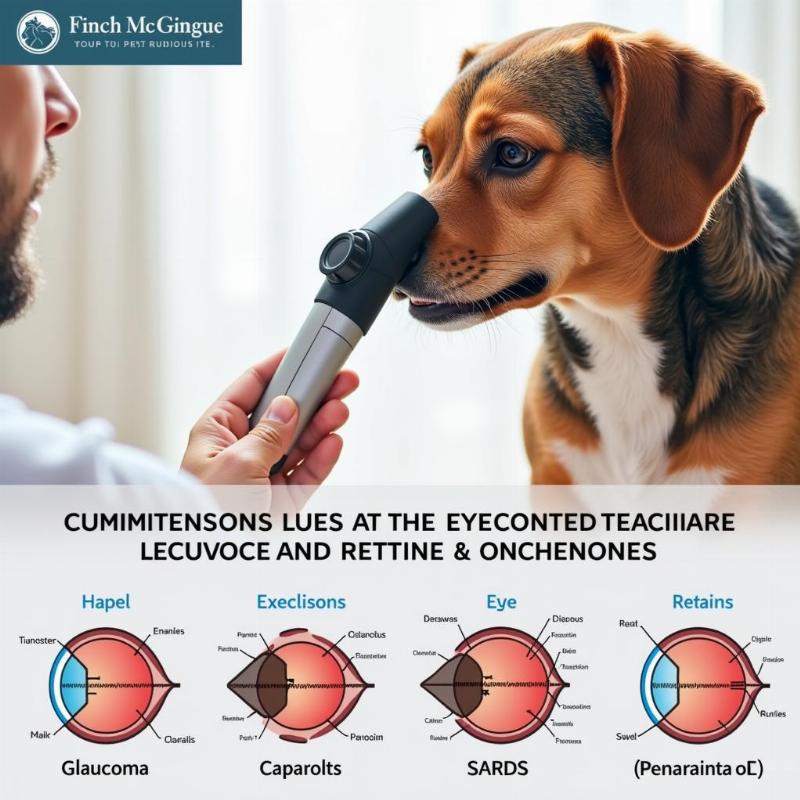Sudden vision loss in dogs can be a frightening experience for both the pet and the owner. Understanding the potential causes, symptoms, and treatment options is crucial for providing the best possible care for your furry friend. This comprehensive guide will explore everything you need to know about sudden vision loss in dogs, from recognizing the early signs to seeking appropriate veterinary care in the US.
Recognizing the Signs of Vision Loss in Your Dog
How do you know if your dog is experiencing vision loss? While dogs can’t tell us what they’re seeing, there are several behavioral changes that can indicate a problem with their sight. These include bumping into furniture, hesitancy to navigate stairs or unfamiliar environments, disorientation, changes in pupil size or appearance, increased anxiety, and a reluctance to play fetch or engage in other visually-guided activities. Subtle changes in eye appearance, such as cloudiness, redness, or discharge, can also be indicators.
If you notice any of these signs, it’s crucial to schedule an appointment with your veterinarian immediately. Early diagnosis and treatment are essential for addressing the underlying cause and potentially preserving your dog’s vision.
Common Causes of Sudden Vision Loss in Dogs
Sudden vision loss in dogs can result from various underlying conditions, ranging from infections and injuries to more serious diseases like glaucoma, cataracts, and retinal detachment. Certain breeds are also predisposed to specific eye conditions, highlighting the importance of understanding breed-specific risks.
 Common causes of sudden vision loss in dogs
Common causes of sudden vision loss in dogs
- SARDS (Sudden Acquired Retinal Degeneration Syndrome): This condition leads to rapid and irreversible blindness.
- Glaucoma: Increased pressure within the eye can damage the optic nerve and cause vision loss.
- Cataracts: Clouding of the eye’s lens can impair vision and eventually lead to blindness.
- Retinal Detachment: Separation of the retina from the back of the eye can result in partial or complete vision loss.
- Trauma: Eye injuries can cause various degrees of vision impairment, from minor scratches to severe damage.
- Infections: Certain infections can affect the eye and potentially lead to vision loss.
Diagnosing Sudden Vision Loss: What to Expect at the Vet
Your veterinarian will conduct a thorough ophthalmic examination to assess your dog’s eye health. This may involve checking pupil reflexes, evaluating the internal structures of the eye, and measuring intraocular pressure. Additional diagnostic tests, such as blood work, ultrasound, or electroretinography (ERG), may be necessary to determine the underlying cause of the vision loss.
Treatment Options and Management Strategies
Treatment for sudden vision loss depends on the underlying cause. In some cases, such as infections or injuries, treatment may involve medications, eye drops, or surgery. For conditions like SARDS or glaucoma, management focuses on supporting your dog’s comfort and adapting to their vision loss. Creating a safe and predictable environment, using verbal cues, and providing enrichment activities can greatly improve the quality of life for blind dogs.
Living with a Blind Dog: Tips for Supporting Your Furry Friend
Adapting to life with a blind dog can be challenging, but with patience and understanding, you can help your dog live a full and happy life. Maintaining a consistent environment, using scent markers for navigation, and providing tactile toys can help your dog adjust to their vision loss. Positive reinforcement training and verbal cues can also be invaluable tools for communication and guidance.
FAQ
-
What should I do if my dog suddenly goes blind? Seek immediate veterinary care to determine the cause and begin appropriate treatment.
-
Is sudden blindness in dogs painful? While vision loss itself may not be painful, some underlying conditions, such as glaucoma, can cause discomfort.
-
Can vision loss in dogs be reversed? The possibility of reversing vision loss depends on the underlying cause. Some conditions, like cataracts, can be treated surgically, while others, like SARDS, are irreversible.
-
How can I make my home safe for a blind dog? Avoid rearranging furniture, block off stairs and other hazards, and use baby gates to restrict access to unsafe areas.
-
What are some enrichment activities for blind dogs? Scent games, puzzle toys, and walks in familiar environments can provide mental and physical stimulation for blind dogs.
Connect with Beautdogs.us for More Expert Advice
Beautdogs.us is your premier destination for all things dog-related in the US. We provide expert advice on dog breeds, grooming, training, nutrition, and healthcare. Our team of experienced veterinarians and dog enthusiasts is dedicated to helping you provide the best possible care for your canine companion. Contact us today for personalized guidance and support! Email: [email protected], Phone: +1 501-555-7529. Visit Beautdogs.us for more valuable resources and information.